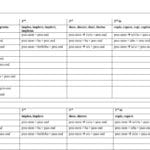Let’s master “travailler,” a fundamental French verb that goes beyond simply meaning “to work.” It encompasses effort, struggle, and even emotional turmoil. This guide is your comprehensive resource for understanding “travailler,” from the simple present tense to the more nuanced subjunctive, complete with examples and practical tips. So, prepare to conquer French verb conjugation and express yourself fluently!
Mastering the Present Tense
The present tense is essential for describing habits, routines, and general truths. Think of it as your daily routine or your current work situation. “Je travaille,” “tu travailles,” “ils travaillent” – it’s all about what you do regularly.
| Pronoun | Conjugation | Example | English Translation |
|---|---|---|---|
| Je | travaille | Je travaille à la bibliothèque. | I work at the library. |
| Tu | travailles | Tu travailles dur. | You work hard. |
| Il/Elle/On | travaille | Il/Elle/On travaille chez Google. | He/She/One works at Google. |
| Nous | travaillons | Nous travaillons ensemble. | We work together. |
| Vous | travaillez | Vous travaillez bien. | You (formal/plural) work well. |
| Ils/Elles | travaillent | Ils/Elles travaillent à Paris. | They work in Paris. |
Notice how the endings change slightly depending on the pronoun. This is the core of conjugation—dressing “travailler” in different outfits according to who’s performing the action. This likely seems straightforward, and for regular verbs like “travailler,” it generally is.
Conquering the Past Tense: Passé Composé
The passé composé is your go-to for describing completed actions. It’s like taking a snapshot of something you’ve finished. “Travailler,” in this tense, uses “avoir” (to have) as its helping verb.
| Pronoun | Conjugation | Example | English Translation |
|---|---|---|---|
| J’ | ai travaillé | J’ai travaillé hier. | I worked yesterday. |
| Tu | as travaillé | Tu as travaillé tard. | You worked late. |
| Il/Elle/On | a travaillé | Il a travaillé toute la nuit. Elle a travaillé toute la nuit. On a travaillé toute la nuit. | He worked all night. She worked all night. One worked all night. |
| Nous | avons travaillé | Nous avons travaillé sur un projet. | We worked on a project. |
| Vous | avez travaillé | Vous avez travaillé avec diligence. | You (formal/plural) worked diligently. |
| Ils/Elles | ont travaillé | Ils/Elles ont travaillé pendant des années. | They worked for years. |
The passé composé is formed by conjugating avoir in the present tense and adding the past participle of travailler, which is travaillé. With practice, this two-step process quickly becomes automatic.
Painting a Picture of the Past: Imparfait
The imparfait describes ongoing or habitual actions in the past. Think of it as setting the scene—describing what used to happen. “Je travaillais,” “tu travaillais,” “ils travaillaient”—it’s all about the backdrop of the past.
| Pronoun | Conjugation | Example | English Translation |
|---|---|---|---|
| Je | travaillais | Je travaillais à Londres avant. | I used to work/was working in London before. |
| Tu | travaillais | Tu travaillais toujours tard quand tu étais étudiant. | You always used to work/were always working late when you were a student. |
| Il/Elle/On | travaillait | On travaillait sur un projet passionnant. | We were working on an exciting project. |
| Nous | travaillions | Nous travaillions souvent le week-end. | We often used to work/were often working on weekends. |
| Vous | travailliez | Vous travailliez où avant? | Where did you use to work/were you working before? |
| Ils/Elles | travaillaient | Ils travaillaient dur chaque jour. | They used to work/were working hard every day. |
The “-ais,” “-ait,” “-ions,” “-iez,” and “-aient” endings are your clues that you’re in imparfait territory. It’s all about the nuances of past actions.
Planning for the Future: Futur Simple
The futur simple is how you talk about future plans, predictions, or intentions. It’s the “I will work” or “they will work” tense. It’s formed by adding endings to the infinitive travailler.
| Pronoun | Conjugation | Example | English Translation |
|---|---|---|---|
| Je | travaillerai | Je travaillerai à domicile demain. | I will work from home tomorrow. |
| Tu | travailleras | Tu travailleras sur le projet vendredi? | Will you work on the project Friday? |
| Il/Elle/On | travaillera | Il travaillera tard ce soir. | He will work late tonight. |
| Nous | travaillerons | Nous travaillerons ensemble sur la présentation. | We will work on the presentation together. |
| Vous | travaillerez | Vous travaillerez le week-end? | Will you be working this weekend? |
| Ils/Elles | travailleront | Elles travailleront à l’étranger l’année prochaine. | They will work abroad next year. |
The futur simple is quite straightforward for expressing intentions and making plans about your future endeavors. You might even use it to discuss how one might vanish into the shadows using a cloak of elvenkind 5e.
Beyond the Basics: Expanding Your “Travailler” Repertoire
Other Tenses and Moods
Beyond these core tenses, “travailler” has other forms, like the plus-que-parfait (what you had done), the futur antérieur (what you will have done), the subjunctive (for expressing wishes or uncertainty), the conditional (for “what if” situations), and the imperative (for giving commands). While ongoing research in linguistics suggests our understanding of these nuances could evolve, they are currently considered essential for expressing complex ideas.
Pronominal Form: “Se Travailler”
“Se travailler” means “to worry oneself” or “to fret.” It’s reflexive, meaning the action is directed back towards the subject. For example, “Je me travaille pour l’examen” means “I’m worrying myself about the exam.”
Definition and Usage
“Travailler,” defined as “exercer un effort continu en vue de produire ou de modifier quelque chose” (to exert continuous effort in order to produce or modify something), is conjugated with “avoir” in compound tenses. It follows a regular -er verb pattern, much like “marcher.”
Transitivity
“Travailler” is versatile, functioning as both a transitive and intransitive verb. It can take a direct object (“Je travaille le bois” – I work the wood) or stand alone (“Je travaille dur” – I work hard).
Idiomatic Expressions
Idiomatic expressions add color to your language. Consider “travailler comme un fou/une folle” (to work like crazy) or “se tuer à travailler” (to work oneself to death).
Synonyms
While “travailler” is common, synonyms like “bosser” (informal) and “œuvrer” (formal) offer alternative ways to express similar ideas, each with its own nuance.
Common Mistakes and Tips
- Confusion with “travail”: “Travail” is the noun form (work), while “travaille” is a conjugated verb form.
- Agreement Errors: Ensure correct subject-verb agreement, especially in complex sentences.
Tips for Mastery:
- Practice Regularly: Consistent practice is key. Form your own sentences, imagine scenarios, and incorporate different tenses.
- Use Flashcards: Flashcards can be helpful for memorizing conjugations.
- Immerse Yourself: Listening to French speakers and reading French texts will reinforce what you learn.
By mastering “travailler,” you unlock a key to expressing yourself effectively in French. So, embrace the challenge, practice diligently, and soon you’ll be using this versatile verb with confidence. Bon courage!
















